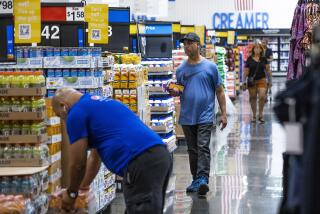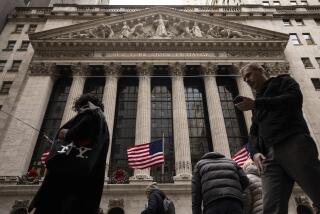Consumer confidence falls sharply amid ‘fiscal cliff’ worries
WASHINGTON -- After displaying resilient confidence over the last few months, consumers are finally starting to show the pangs of the looming “fiscal cliff.”
A leading measure of consumer confidence fell sharply to a four-month low this month, suggesting that worries about future tax hikes and government spending cuts are taking a toll on sentiment.
The drop reported Friday in the Thomson Reuters/University of Michigan’s consumer mood index -- to 74.5% from 82.7% last month -- tempered the better-than-expected report Friday from the Labor Department. The moderate pace of job gains held up in November despite Hurricane Sandy, and the jobless rate dipped to 7.7% last month from 7.9% in October.
Consumer confidence surveys are more forward-looking. And the latest report showed measures of both current conditions and future expectations falling. Retailers added a big batch of jobs in October and November, and they’re banking on solid, though not spectacular, holiday sales. But with the economy driven largely by personal spending, job growth could be hurt if anxious consumers pull back.
Quiz: How much do you know about the ‘fiscal cliff’?
“As the deadline to resolve the fiscal cliff draws closer with no resolution in sight as of yet, households are concerned about a potentially sharp drop in their after-tax incomes,” said Capital Economics in a note after the release of the consumer confidence survey.
The December reading of consumer confidence brings the index back down to where it was during the summer, and puts it more in line with business sentiments, which have deteriorated noticeably.
“Fortunately, consumer fundamentals are holding up relatively well: Job growth is steady, gas prices are falling, the housing market is finally turning the corner, and equity prices have rebounded,” said Timothy Daigle, an analyst at Moody’s Analytics, in a note to clients Friday. “If policymakers are able to come to an agreement in a reasonable amount of time, as we expect, confidence should bounce back quickly as the recovery accelerates in six months’ time.”
More to Read
Inside the business of entertainment
The Wide Shot brings you news, analysis and insights on everything from streaming wars to production — and what it all means for the future.
You may occasionally receive promotional content from the Los Angeles Times.











